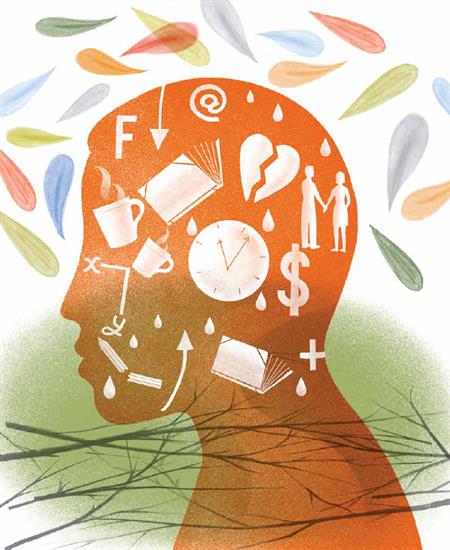Stressed Out
Mental health problems in the biomedical research community are rampant—here are ways to address them.
by Deborah Abrams Kaplan

Burnout. Depression. Anxiety. Stress. These are common feelings among those working in the biomedical community, and they’re often experienced at higher rates than in the general population. But recent research about the pervasiveness of mental
health problems among researchers has led to increased awareness in the scientific community and more avenues for support at both institutional and grassroots levels.
The statistics are alarming for those in research and academia experiencing mental health issues. Thirty-two percent of PhD students have or are at risk of developing a psychiatric disorder, most commonly depression. Organizational policies such as job
demands, supervisor leadership styles and work-family interference were highly associated with PhD students’ mental health disorders, according to a 2017 study in Research Policy. Furthermore, graduate students (90 percent of survey
respondents were PhD candidates) are more than six times as likely to experience depression and anxiety, compared to the general population, according to a 2018 study in Nature Biotechnology.
THANK YOU FOR ASKING
Teresa Evans, PhD, a coauthor of the Nature Biotechnology study, said she and her collaborators were overwhelmed by the impact that launching the survey had on the community. The survey included clinically validated scales for anxiety and depression
and questions about work-life balance and mentor relationships. One week after sending out the survey via direct mail and social media, the researchers received a high volume of responses and “people were thanking us for asking the questions,”
says Evans, assistant professor in the Department of Pharmacology at the University of Texas Health Science Center at San Antonio and the school’s former director of workforce and career development. She says the results did not surprise the
scientific community but that people appreciated having data to point to. Publishing the study led to an outpouring of individuals sharing their stories with Evans and the team. And universities shared their own initiatives and invited the coauthors
to speak on the subject.
These stories about mental health problems are not unique to academia. Clinicians and veterinarians also face stressors that put them at a higher risk for depression, suicide and other mental health challenges. Suicide among female veterinarians is 3.5 times as likely as the general population while suicide among male veterinarians is 2.1 times as likely, according to a 2019 study in the Journal of the American Veterinary Medical Association.
Understanding these industry-related stressors that academics and clinicians face helps inform solutions. For veterinarians, stressors include compassion fatigue, burnout, societal expectations to save every animal, student debt, practice expectations
of high hours and low pay, and the threat of negative practice reviews on social media, says APS member Diane McClure, DVM, PhD, associate professor at Western University College of Veterinary Medicine in Pomona, Calif.
Physicians face pressures of patient care, compassion fatigue, increasing administrative burdens, decreased renumeration and student debt, says Darshan Mehta, MD, MPH, medical director of the Benson-Henry Institute for Mind Body Medicine at Massachusetts
General Hospital in Boston. Biomedical researchers also experience pressure to apply for and procure grants in an age of budget cuts and decreased funding from the National Institutes of Health and other funding agencies.
INSTITUTIONS ARE ADDRESSING MENTAL HEALTH
Employer and student-led initiatives are introducing healthy lifestyle activities through formal and informal programs. As the younger generations climb up an organization’s rungs, these adults bring new cultural norms. A student-run group might create a mindfulness practice or meet up for yoga, Evans says. “There’s something really powerful about that collegiality, making changes from the bottom up, but supported by the top down,” she says.
In any organization, especially large ones, cultural changes take a long time, she says. That said, there are many ways to foster an environment that prioritizes mental health and recognizes and supports the needs of employees and students. Here’s
how some institutions are addressing mental health issues.
Cultivating resiliency: The Benson-Henry Institute for Mind Body Medicine at Massachusetts General Hospital reworked a patient stress management and resiliency program for health care practitioners. The eight-session model—two hours
each session—focuses on developing a mind-body practice, skills for stress awareness and lifestyle strategies. The experiential group model is led by a facilitator. Participants learn movement-based approaches such as yoga, as well as cognitive
restructuring, such as how to stop or redirect negative thoughts that otherwise feed into a cycle of stress. A skill that surgeons gravitated toward was sharing one thing they’re grateful for. “One surgeon gave a powerful example: He never
really appreciated his operating room folks,” Mehta says. Acknowledging that in the group setting gave the physician and others in the group a different view when going back to surgical suite. Practices such as these allow space for reflection
and appreciation, are simple and inexpensive and, yet, have a profound effect on well-being.
Stressing grit and a growth mindset: Western University of Health Sciences in Pomona, Calif., is starting a program for faculty and students about thriving in adversity with a grit and growth mindset. Learning opportunities include books
on the subjects and creating a safe place and a culture where failure is acceptable.
Mental health first aid: McClure recommends mental health first aid training. The eight-hour course teaches how to recognize signs of distress in others, including how and when to ask if someone has thought about harming themselves. She
keeps an app on her phone called Suicide Safe with a checklist of suicide-related interventions and contacts for mental resources throughout the country.
Mentoring: In her study, Evans found that half of respondents who reported anxiety or depression did not feel that their mentors, advisers or principal investigators provided real mentorship, were assets to their careers or that these mentors valued them.
Understanding these relationships is important because of the correlation between mental health and the perception of a mentor relationship, she says.
Targeting the mentor-mentee relationship in higher education, where apprenticeship is core to training, is an intervention. More organizations are starting to acknowledge the value of faculty mentors by giving them more time to properly mentor trainees.
Programs based on the book “Entering Mentoring: A Seminar to Train a New Generation of Scientists” provide structure to discuss expectations and train mentors, Evans says. Mentors need to be mindful of their impact on the mentee to ensure
positive outcomes.
Promoting wellness: School-based wellness programs include bringing in a pianist or offering chair massages during exam week, McClure says. Schools can schedule weekly yoga classes. In the class setting, McClure periodically asks students
to drop their shoulders and pay attention to their breathing. While focused on students, this can benefit faculty as well, though she said it can be challenging to get faculty to adopt these practices.
SELF-CARE TIPS FOR STRESSED RESEARCHERS
Formal programs are not needed to help a colleague or student practice wellness techniques to improve one’s own mental health. Here are some ways to do that.
Recognizing life stressors: Stressors occur in all facets of life, not just work. As the number of stressors increase, Evans says, the potential for mental health struggles increases too. Certain times in academia cause higher stress
levels, including exams, residency interviews and matching, grant cycle deadlines and tenure review. Add in a car accident, family death or other personal stressor, and peers or mentors should have a heightened concern for that individual, with additional
support. “We know that stress is cumulative, and it can be exponential,” Evans says.
Giving permission for self-care: McClure asks her students questions about self-care, such as how much they’re sleeping, if they’re connected to peers and whether they’re eating. “I think my role sometimes as a
professor is to give them permission,” she says. She’s even taught students how to boil eggs so they have healthful snacks to eat when they’re on the run.
Just ask: Asking a person if they’re thinking of harming themselves is important, and they will often tell the truth. However, you need a plan for where to direct them if they respond yes and to ensure they follow up. “You
have to make sure they get the appropriate help,” McClure says.
Changing an institution’s culture isn’t easy, but small steps can lead to larger changes. Some traditional faculty don’t feel comfortable taking a moment during class to ask students to breathe deeply or relax their shoulders, for example, or appreciate that the chair massages during exams actually reduce student stress levels, McClure says. One clinician from a war-torn country couldn’t understand why students were worried when they had access to food and were not getting bombed. “The anxiety of doing well is just as alarming to them as his frame of reference,” she says. Wellness offerings are more than just a nice perk, she says. They’re necessary.
This article was originally published in the November 2019 issue of The Physiologist Magazine.
Mental Health Resources
- Not One More Vet: a veterinarian peer support group on Facebook.
- National Suicide Prevention Lifeline: 800.273.8255
- Suicide Safe: a free mobile app with suicide prevention strategies and tips to assist others who are contemplating suicide. It includes resources to search by location.
- Mental Health First Aid: an eight-hour course offered by the National Council for Behavioral Health.
The Physiologist Magazine
Read the Latest Issue
Don’t miss out on the latest topics in science and research.
View the Issue Archive
Catch up on all the issues of The Physiologist Magazine.
Contact Us
For questions, comments or to share your story ideas, email us or call 301.634.7314.


